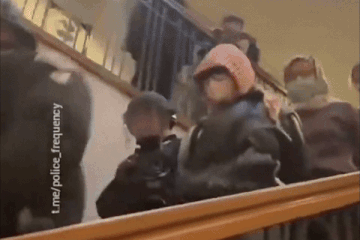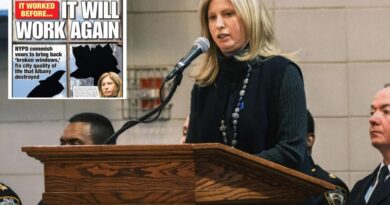Students are finally being held accountable by colleges

It seems like we are finally seeing the return of one of the most important words you can hear on a college campus: “No.”
Last week, some 150 students at Pomona College, a liberal arts school in Claremont, California, stormed the building that houses school president Gabrielle Starr’s office — and refused to leave, in protest of the removal of pro-Palestinian art on the campus.
Starr did not shrink from the invaders, who were filming her. Instead, she confronted the students, issuing a warning.
“If you do not leave within the next ten minutes, every student in this building is immediately suspended from this institution,” she said in a video posted on X, adding that students from outside schools will be banned from campus.
She put her foot down and showed that, on her watch, actions have consequences.
Starr’s warning came after swarms of pro-Palestinian students at Vanderbilt University pushed past a security guard and occupied Kirkland Hall, the site of the chancellor’s office, late last month.
Things reached parody level in Nashville when students called 911 because one of them needed to change her tampon. Four were arrested; three were expelled, one suspended and 22 given disciplinary probation.
Last week, University of Michigan president Santa Ono issued a new policy against “disruptive activity” after he was shouted down by students while giving remarks at a convocation.
A handful of years ago, this all would have been unremarkable: school administrators wielding the proverbial yardstick and doling out punishment for behavior that breaks norms, the law or school policy.
But in the last decade, many campus leaders have ostensibly turned to “gentle parenting” on an institutional level. It’s all led to an erosion of free speech and authority, and the veneration of student temper tantrums — mostly fueled by micro-aggressions, identity politics and, lately, the Middle East.
The results of this flawed approach have been on full display in the wake of the October 7 massacre in Israel, as campuses have devolved into chaos over the ensuing conflict. Students demanding divestment from Israel have occupied buildings, led (brief) hunger strikes and called for intifada.
Not that there weren’t harbingers of such behavior in 2015 and 2017, at both Yale and Evergreen College, in Washington, where professors were the target of intense student protests because they dared question woke orthodoxy.
Since then, we’ve seen angry kids disrupt speakers on campus, drowning them out with jeers — like when Stanford Law School students shouted down Trump-appointed US Circuit Judge Stuart Kyle Duncan in March 2023.
Riley Gaines said she was assaulted by trans activists in April of last year while speaking at San Francisco State University, where she had to barricade herself in a classroom. The school, instead of apologizing to Gaines, responded by acknowledging the protestors’ pain. (In February, the school’s police dropped the investigation, which Gaines said “sets a dangerous precedent“).
Students have been emboldened as the adults retreat — lest the mobs get them fired or, worse, canceled. The inmates have been running the asylum; but if the two weeks have been any indication, there’s a correction afoot.
There’s also been another sliver of hope, in a different realm of university leadership — a success story fueled by a healthy dose of “no.”
In the lead-up to Monday’s NCAA Men’s National Championship, UConn basketball head coach Danny Hurley was interviewed about his approach to recruiting players.
“There’s measurable talents you have to have,” he said. “The height, the speed, the skill set. But we spend a lot of time really focusing on the parents. Are they going to be fans of their sons when they are on campus or are they going to be parents? Are they going to hold them accountable and have an expectation that [if] something goes wrong…their son has to work harder, do more, earn his role?”
In other words: Hurley is not afraid to say no to talent if they haven’t been schooled in the ABCs of accountability culture.
It’s an important distinction in this ever-shifting college sports landscape, where some athletes are earning more than coaches thanks to Name Image and Likeness (NIL).
Power dynamics have radically changed, placing players in pole position.
And still, Hurley is old school — the captain of the ship, rather than letting student athletes lead. There’s a hierarchy there, and the big cheese isn’t putting up with nonsense.
It paid off when the team won for the second year in a row: Proof that guardrails for the young and malleable are needed to build responsible, formidable adults. Maybe even champions.
Sure, activism isn’t a varsity sport — even if some of these student protesters are approaching it like they’re competing for a national title.
But sports can offer a philosophy to life. A framework. A system. Especially in academia, which is explicitly tasked with molding young minds and building intellect, capability and resilience.
Hurley’s approach works. Let’s hope school administrators — and parents still indulging their kids — consider the playbook.



